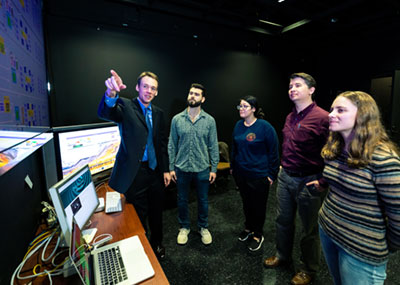Read time:

Dr. Ryan Fisher of the Department of Physics, Computer Science and Engineering (PCSE) is one of a select group of scientists to announce the detection of four new gravitational waves. These detections will broaden the understanding of black holes and the composition of the universe. Fisher is one of the foremost experts on gravitational waves and is a 2016 recipient of the Special Breakthrough Prize in Fundamental Physics.
Gravitational waves are distortions in space caused by objects with huge masses moving at nearly the speed of light, and carrying the amount of energy of several times the total energy of the sun. These gravitational waves can travel for billions of years before they reach the Earth, where their effect is extremely tiny, requiring sensitive detectors to measure them.
The discovery – announced December 1 at a scientific meeting – is the latest accomplishment of Fisher and a team of researchers affiliated with the Laser Interferometer Gravitational-Wave Observatory (LIGO) in the U.S. and its European counterpart Virgo. The publications and science summaries associated with the announcement are available at the link below.
The LIGO and Virgo detectors first captured signals of a wave emanating from a massive collision in outer space in 2015. The new announcement concerns gravitational waves from a total of nine stellar-mass binary black hole mergers and one binary neutron star merger.
"We are very excited to be at this turning point in gravitational wave astrophysics, where we are just beginning to use gravitational wave observations as a new tool for conducting astronomy," Fisher said.
His research, aided by Christopher Newport students, is supported by a four-year, $10.8 million grant from the National Science Foundation. Through this work, Fisher seeks to develop new methods for the exploration of the universe.
"Gravitational waves and black holes are among the most dramatic predictions of Einstein's general theory of relativity,” Fisher said. “This award funds a critical part of the cyberinfrastructure that we will use to make new detections, and thereby continue unlocking the mysteries of the universe."
The project will result in the development and operation of substantial computational infrastructure at Christopher Newport, which Fisher says is an essential component in the detection of gravitational waves. The two LIGO detectors themselves are housed in Hanford, Washington and Livingston, Louisiana.
The LIGO and Virgo detectors are down for upgrades now but will begin observing again early next year. “We expect a hugely increased rate of detections, possibly as many as one per week,” Fisher said. The Christopher Newport team will then take that data and join over 1,000 scientists in 18 countries in hunting for evidence of new gravitational waves.
Christopher Newport is currently the only Virginia university linked to the project. The research team includes Fisher, two undergraduates, three graduate students and PCSE Associate Scientist Robert Bruntz. They meet weekly to go over the latest LIGO developments and will soon be housed in a laboratory, designed specifically for the work, that is now under construction.
One of the students, freshman Grace Johns, recently received a competitive Research Apprentice Program position for spring 2019 through the Office of Undergraduate Research and Creative Activity. She will help scientists learn how to distinguish actual detections of gravitational waves from noise in the LIGO detectors.
“This is a remarkable opportunity for an undergraduate, and it is made possible by the University’s commitment to undergraduate research,” Fisher said. “I hope the Christopher Newport community will continue to support student research so that we can all gain a deeper understanding of the mysteries of our universe.”